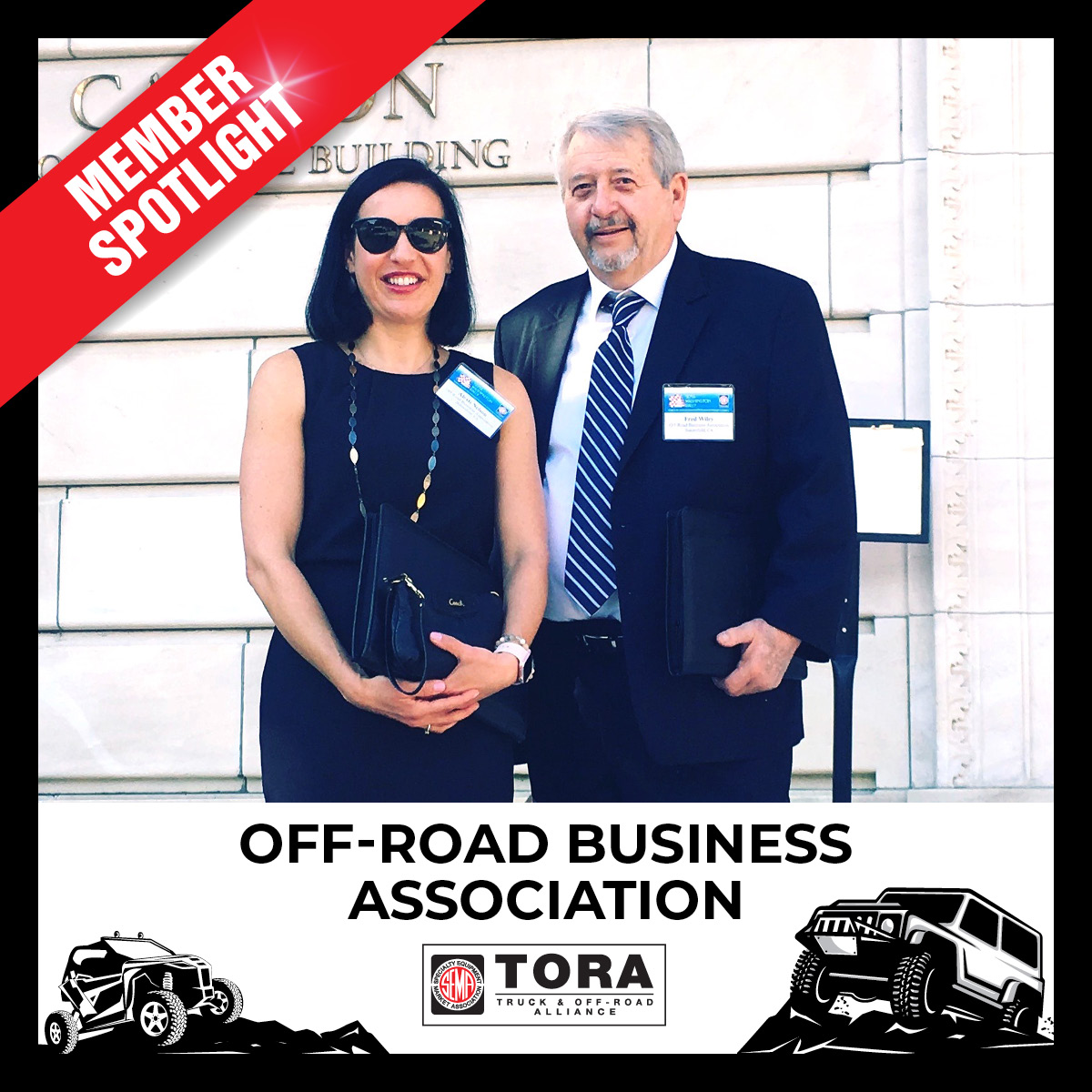
The Off-Road Business Association (ORBA) is TORA's newest member spotlight company. In this month's feature, company operations manager Alexis Nelson shares ORBA's breakthrough moment and current projects.
SEMA: Tell us the story of your company. How did it start?
Alexis Nelson: In 2001, a group of 10 business owners representing the off-road industry joined together because they wanted to take the grassroots and volunteer efforts to the next level of protecting Off-Highway Vehicles (OHV) access in the California desert. This group wanted to enhance these efforts while financially supporting professional staff dedicated to fighting desert closures included in the West Mojave Plan. The goal was to have a combination of legal representation at the State Capitol, lobbyists, allies in motorized recreation and land-use advocates in a coordinated effort to keep closures from spreading not only in the region but across the country. That is how the ORBA was created.
Twenty years later, ORBA continues to operate as a trade-based organization, creating and following a business paradigm unlike other nonprofits in organized recreation. ORBA is an innovative leader providing professional trail advocacy for motorized access and directing the future of OHV. ORBA influences policy and implements change with congressional lobbying and the ability to work cohesively through partnerships.
SEMA: What was your company's breakthrough moment?
AN: ORBA was instrumental in many breakthroughs in keeping areas open for off-road use; however, the pinnacle of breakthroughs happened in Johnson Valley where legislation action prevailed. Johnson Valley offers the largest open riding area in the United States. What this means is that there are no travel restrictions or designated routes that must be followed. It is truly the off-road mecca!
While Johnson Valley is popular among the off-road community, it is also where the United States military trains for warfare exercises due to the expansive and inhabited terrain. Rather that draw a decisive line in the sand relinquishing the all-or-nothing approach, the off-road community joined forces to propose a shared-use concept. The idea keeps Johnson Valley open to off-road use while accommodating the military's training needs—understanding that off-road recreation can continue to exist when the military is not actively training during designated times of the year. The agreement was solidified into legislation under the National Defense Authorization Act, signed by President Obama in 2015.
Consequently, this process led to other congressionally delegated OHV areas across the country.
The learning experience was about collaboration and developing a solution that works for all parties. What we also learned is how to obtain congressional protection for these designated OHV areas. This level of designation has the same protection and power of wilderness areas so we can focus our efforts on continual access in other important places.
SEMA: Tell us about your business now in 2022 and projects that you are working on.
AN: This year, ORBA is celebrating 21 years and continues to grow and thrive. ORBA was part of creating an organization called One Voice. One Voice is dedicated to connecting the many aspects of off-road recreation under a united voice. Recently, ORBA create a non-profit 501(c)(3) Foundation under One Voice. The focus of the foundation is to connect with other recreational groups and enthusiasts outside of the off-road umbrella. The outreach includes overlanding, sportsmen, mountain biking and camping to name a few.
The UTV Impact Campaign will be launching soon. UTV Impact is a program designed to address the impact OHV riders are having on public trails and with other trail users. The OHV community is teaming up with ORBA, One Voice, Tread Lightly! and Industry to share simple ways we can do our part to keep public trails and riding areas open for the future.
Another important project ORBA is working on is keeping Oceano Dunes open to OHV use. All too often the OHV community is faced with closure issues and protecting access requires litigation. It's not where we want to operate; however, litigation is what it takes to continue the fight for OHV access. ORBA feels strongly that rules and laws need to be followed and with the Oceano Dunes situation, unelected commissions have been stepping outside of their authority.
SEMA: Tell us about a product of yours which you are most proud.
AN: ORBA is about building relationships and creating plans and processes through collaboration. While ORBA does not provide physical products, ORBA is very proud of our team. The diversity, talent, and success of the ORBA board of directors, ORBA professional staff and our important and valued partners, such as SEMA, is what makes ORBA what it is today. Our direction continues to stem from the founding principles of connecting enthusiasts, grassroots and industry through shared vision, value, and passion for off-road.
This has been accomplished by building relationships through trust, respect, follow-through and getting the job done. ORBA utilizes a transparent and strategic process when it comes to resolving issues by looking through the lens of identifying and mobilizing the right people at the right time.
SEMA: What advice do you have for young professionals contemplating a career in the automotive aftermarket?
AN: This is a fun, fast-paced and dynamic environment where everyone is connected. Networking, team and relationship building are important to the success of any business. We need this generation to continue to advocate for responsible off-road recreation.
Fill out an TORA-member spotlight form to highlight how your company is contributing to the truck and off-road specialty-equipment industry.
Selected candidates are eligible to be featured on TORA's social media, SEMA News and future TORA member updates.
